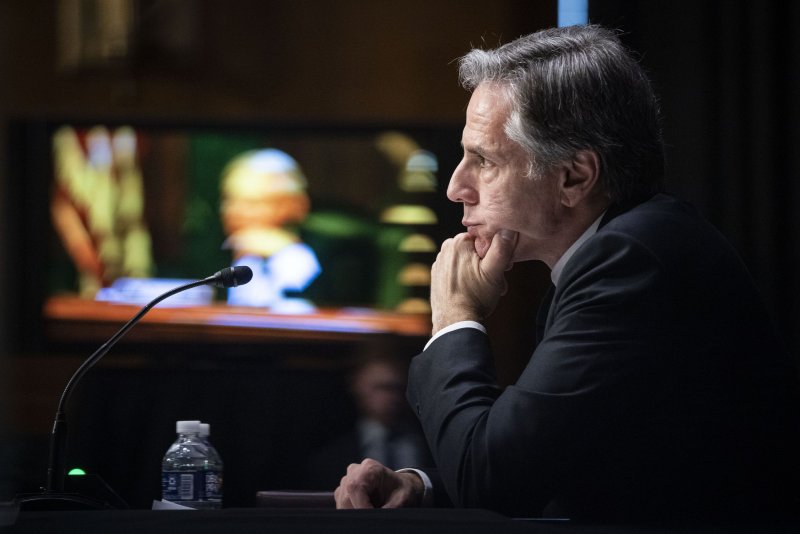In a coordinated move with the U.S. Treasury, the State Department under Secretary Antony Blinken imposed sanctions against companies in Asia aiding Iran in selling and shipping its petrochemical products. Pool File Photo by Al Drago/UPI |
License Photo
Sept. 29 (UPI) -- The United States has blacklisted a network of 10 companies throughout Asia involved in the sale of Iranian petrochemical products, as the Biden administration seeks to tighten its financial vices on Tehran amid stalled talks on signing a new nuclear pact and mass anti-regime protests in the Middle Eastern nation.
The Treasury identified eight Iranian brokers and front companies in the United Arab Emirates, Hong Kong and India for sanctions on accusations of facilitating financial transfers and shipping petroleum and petrochemical products for Iran.
In a coordinate move, the State Department designated two China-based companies, a commercial crude oil storage facility that stores Iranian petrochemical products and a ship manager that has transported those products.
A panama-flagged oil tanker operated by one of the identified companies was also designated for its involvement.
"As Iran continues to accelerate its nuclear program in violation of the JCPOA, we will continue to accelerate our enforcement of sanctions on Iran's petroleum and petrochemical sales under authorities that would be removed under the JCPOA," the Treasury said in a statement, referring to the landmark Obama-era Joint Comprehensive Plan of Action by its initials.
Signed in 2015, the multination Joint Comprehensive Plan of Action sought to keep Iran from gaining a nuclear weapon through opening its nuclear program to international inspections and other regulations in exchange for sanctions relief.
In 2018, then-President Donald Trump withdrew the United States from the deal and slapped hefty sanctions against Iran while calling the landmark accord "defective at its core," with Iran responding by repeatedly reneging on its JCPOA responsibilities.
Since President Joe Biden was elected November 2020, he has repeatedly sought Iran's return to the deal, but negotiations have seemingly stalled.
Thursday's sanctions are the fourth tranche to target Iran's petrochemical industry since mid-June, and the Treasury said it will continue imposing punitive measures "on a regular basis" with the aim to strangle its exports of such products.
"The United States is committed to severely restricting Iran's illicit oil and petrochemical sales," Under Secretary of the Treasury for Terrorism and Financial Intelligence Brian Nelson said. "So long as Iran refuses a mutual return to full implementation of the Joint Comprehensive Plan of Action, the United States will continue to enforce its sanctions on the sale of Iranian petroleum and petrochemical products."
The sanctions were also imposed a week after the Biden administration targeted Iran's so-called morality police and seven senior security officials after a young Iranian women who was arrested in Tehran for violating the country's strict hijab laws died in their custody earlier this month.
Anti-regime protests in response to the woman's death have spread countrywide and have been met with a violent crackdown that has been denounced by western nations. According to the Oslo-based Iran Human Rights organization, at least 83 people have been confirmed dead amid the protests and thousands more have been arrested.
State Department principal deputy spokesperson Vedant Patel described Thursday's economic measures against Iran during a press conference in Washington, D.C., as "standard enforcement of sanctions not related to anything."















